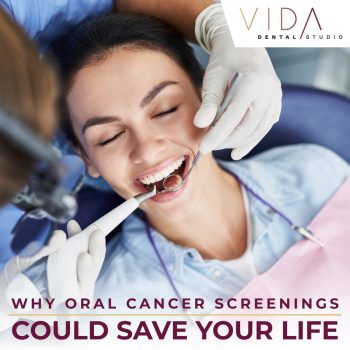Understanding Oral Cancer: What You Need to Know
 What is Oral Cancer?
What is Oral Cancer?
Oral cancer refers to cancers that develop in the mouth, throat, lips, tongue, cheeks, or the floor of the mouth. These cancers often start as subtle changes—small sores, lumps, or discolored patches—that may go unnoticed without a professional examination. That’s why regular checkups at a compassionate, thorough dental office like VIDA Dental Studio matter more than you may think.
Common Risk Factors for Oral Cancer
While tobacco use and heavy alcohol consumption are the most well-known causes, other risk factors include HPV infection, excessive sun exposure (which can affect the lips), poor nutrition, and a family history of cancer. Even individuals without these risk factors can develop oral cancer. Even individuals who lead otherwise healthy lives can still be at risk—oral cancer doesn’t always follow the rules.
Signs and Symptoms to Watch Out For
Early symptoms of oral cancer can be subtle. These include:
- Persistent mouth sores
- Red or white patches in the mouth
- Unexplained bleeding
- Difficulty chewing or swallowing
- A lump in the neck or cheek
- Chronic hoarseness or sore throat
If something feels “off” in your mouth, don’t ignore it. At VIDA Dental Studio, we’re here to listen—no judgment, just gentle care.
The Importance of Regular Oral Cancer Screenings
Why Early Detection is Key
Early detection of oral cancer dramatically increases the chances of successful treatment. When caught in the initial stages, the five-year survival rate is over 80%. That statistic isn’t just a number—it’s peace of mind for you and your loved ones. Unfortunately, many cases are diagnosed late due to the silent nature of the disease.
How Oral Cancer Screenings Can Improve Outcomes
A simple screening performed during your regular dental visit can spot early warning signs before they develop into something more serious. At VIDA Dental Studio, it’s not just a checkup—it’s a chance to catch the unseen, protect your future, and offer reassurance when you need it most. Early-stage cancers can often be treated less aggressively and with fewer long-term effects.
Statistics on Oral Cancer Survival Rates
According to the American Cancer Society:
- The overall 5-year survival rate for oral cavity and oropharyngeal cancer is about 66%.
- If diagnosed early, the survival rate increases to over 80%.
- However, less than 30% of cases are caught at an early stage, largely due to the lack of routine screenings.
At VIDA Dental Studio, we believe you deserve to be in that 80%—and we’re here to help make that happen.
What to Expect During an Oral Cancer Screening at VIDA Dental
The Visual Examination
At VIDA Dental Studio, your oral cancer screening starts with a thorough visual inspection. Our dentists will look for abnormalities such as discoloration, lesions, swelling, or asymmetry in the mouth and surrounding tissues.
Palpation of the Head and Neck
Next, we gently feel around the jawline, neck, and under the chin for any lumps or irregularities that may suggest deeper concerns. This tactile exam is quick, painless, and incredibly informative.
Advanced Screening Technologies
VIDA Dental Studio utilizes dental technologies to enhance the accuracy of oral cancer detection. Using advanced tools like intraoral cameras and special lighting, we can see beyond what the eye can catch, so you can feel even more confident in your care.
Who Should Get Screened for Oral Cancer?
Recommended Screening Frequency
We recommend annual screenings for most adults as part of their routine dental exams. However, depending on individual risk factors, more frequent checks may be advised. We’ll tailor your care plan to fit your unique needs—because you’re never just a chart in our office.
High-Risk Individuals Who Should Be Screened Regularly
You’re considered high-risk if you:
- Use tobacco or alcohol
- Have a history of HPV
- Are over the age of 40
- Have experienced prolonged sun exposure
- Have a weakened immune system
For these patients, bi-annual screenings may be suggested. If this sounds like you, don’t wait—screening is simple, and your future self will thank you.
Busting Myths About Oral Cancer
Myth: Oral Cancer Only Affects Smokers
While smoking significantly increases your risk, non-smokers are not immune. HPV-related oral cancers are rising, especially among younger, otherwise healthy adults.
Myth: Oral Cancer is Rare
Oral cancer is actually one of the most common cancers worldwide, with tens of thousands of new cases diagnosed each year in the U.S. alone. Increased awareness and routine screenings are critical in reversing this trend. At VIDA Dental Studio, we’re working to shift this narrative—one caring, comprehensive exam at a time.
Beyond the Screening: Maintaining Oral Health
Oral Hygiene Practices for Prevention
Keeping your mouth clean is one of the best defenses. Brush twice a day, floss daily, and keep up with your dental cleanings. Avoiding irritants like tobacco and limiting alcohol also helps reduce your risk.
The Role of Diet in Oral Cancer Prevention
A balanced diet rich in fruits and vegetables, particularly those high in antioxidants, can help bolster your immune system and protect oral tissues from harmful changes. Staying hydrated and avoiding processed foods can further support overall oral wellness.
Schedule Your Oral Cancer Screening at VIDA Dental Today!
Why Choose VIDA Dental for Your Screening?
At VIDA Dental Studio, we don’t rush our appointments. We take time to understand each patient, answer questions, and perform detailed exams with care. Your comfort and trust are always our priorities. Our dentists combine clinical excellence with a warm, patient-focused experience, ensuring you leave empowered, not anxious.
Easy Appointment Scheduling
Booking your oral cancer screening is simple. Call us at (505) 303-3757 or visit vidadentalsf.com to schedule your appointment online. Your health is worth it.
Disclaimer: The content of this blog is not intended to be a substitute for professional medical advice, diagnosis, or treatment. Always seek the advice of qualified health providers with questions you may have regarding medical conditions.


